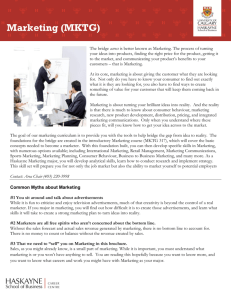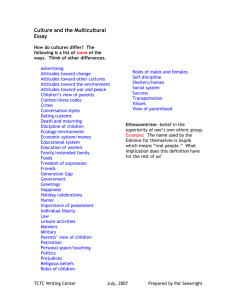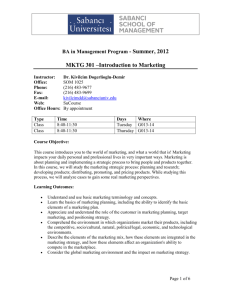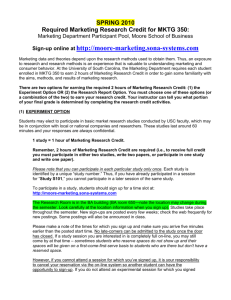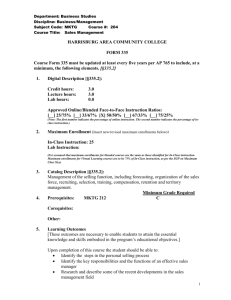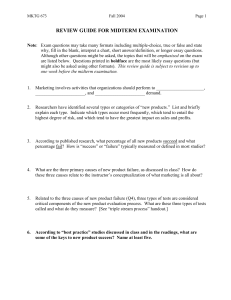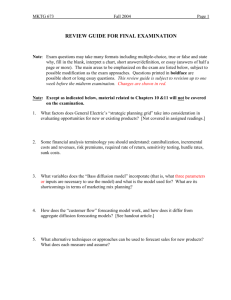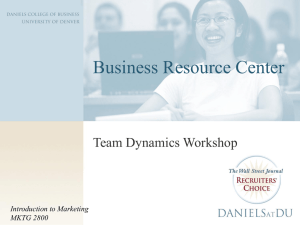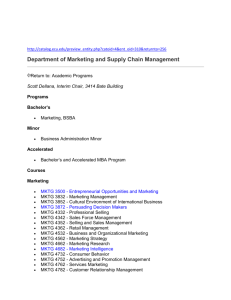Lecture 2 Culture
advertisement
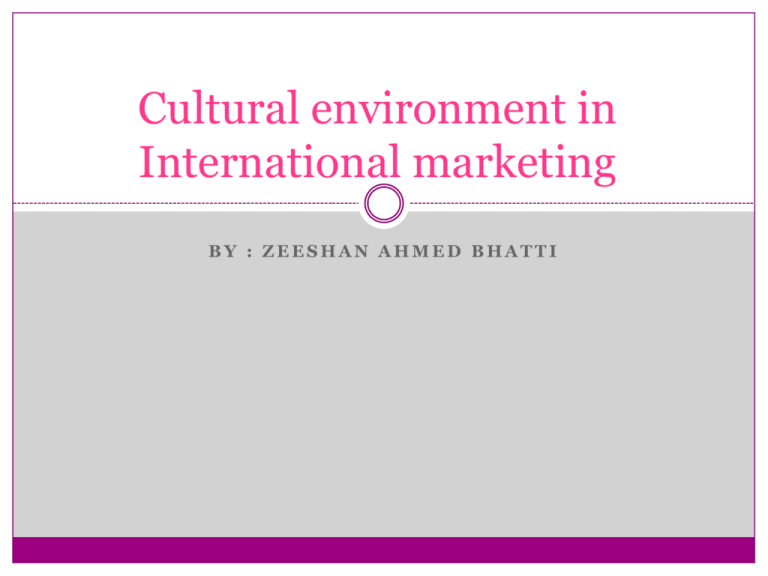
Cultural environment in International marketing BY : ZEESHAN AHMED BHATTI Cultural Environment in Intl’ Mktg Increasing level of trade, opening of markets, enhanced purchasing power of customer allowed marketers to expand their operations Challenge for mktg managers: handle the difference in values and attitudes or ppl in (i) customer behavior (ii) implementing mktg programs Global Customer? Overseas success is based on: Cultural adaptability, patience, flexibility, and tolerance towards other beliefs Aim of Marketers: extent to which similarities exist or can be achieved by marketing Southern Florida (Blend of Hispanic Cultures. Whirlpool study for griddle cook tops) Not only new customers, but also new partners, new employees etc. Cultural diversity must be taken as a benefit – better solutions Culture is “an integrated system of learned behavior patterns that are distinguishing characteristics of the members of any given society” Problem arise during acculturation High Context Culture – context is as important as what is said (e.g., Japan, Pakistan etc.) Low Context Culture – explicit (North America, Australia etc.) Failure to understand the difference might lead to misunderstandings Example of Someone from a LowContext Culture Giving Feedback - YouTube.webm Intracultural Differences based on nationality, race, religion, geographic areas results in subcultures – Intl’ mgrs must identify them (e.g., Hispanic cultures in US want bigger dinning tables) Sometimes managers are accused of Cultural Imperialism Fear in countries due to globalization to threaten their cultural heritage UNESCO convention (2005) on Protection and Promotion of Diversity of Cultural Expressions (e.g., France, Brazil, Canada protect their cultural industries with restrictive rules and subsidies) Movies subsidies, Geographical indications on Products Resulting in behaviors unintended by regulators (e.g., EU programs law of 40%) Quotas may also lead to local productions to satisfy official mandates or capture subsidies Worst scenario: Accused of pushing alien culture, results in boycotts etc. Cultural Framework in Intl’ Mktg LANGUAGE Language is defined as a mirror of culture (not just for spoken language but also non-verbal language) – context based Language capability serves 4 roles in Intl. Mktg.: 1. Aids in information gathering and evaluation efforts 2. Access to local society..speaking local language may make a dramatic difference (e.g., Pepsi Yeh dil Maange More and Pepsi for all) Company communications 4. Interpretation of contexts 3. Language command must be greater than just word recognition (e.g., “Tabling a proposal”, “By the end of the day”, Swedish idioms in Finland etc.) Goodyear (Tire company) identified different names for tires in Spanish-speaking nations such as “Couchos” in Venezuala, Cubiertas in Argentina, Gomas in Chile etc.) Translingual homonyms – language or words offensive in a country (e.g., Kone to Koné –the elevators company) Other features of language (such as Arabs read from right to left) Language diversity can also sometimes be a sign of other types of diversity (e.g., Quebec maintains a French identity – rights of consumers to be informed and served in French language) The Bay company – La Baie (Spends $8 Million on translations every year) English as Lingua Franca in Quebec – French govt. law to ban words Also to websites such as with “.fr” extension to be in French German society to preserve German language from Denglish Polish to be used in advertisement by foreign companies Therefore, hiring local ad agencies can prevent problems Careful translations should be done – backtranslation? Translate emotions not words! Translations Mistakes.docx Non-Verbal Language Managers must analyze and become familiar with the hidden language in foreign cultures 5 key topics provide a starting point – TIME, SPACE, MATERIAL POSSESSIONS, FRIENDSHIP PATTERNS and BUSINESS AGREEMENTS Setting Meeting times in Hong Kong is futile In some countries, extended social acquaintance is important - rushing into business will not be rewarded Amount of space required from others (e.g., Arabs and Latinos Vs. Westerners) International Body Language must be included in nonverbal Intl. Business (e.g., finger-and-thumb OK sign, Success in US, worthless deal in France, bribe asked in Japan and very offensive for Brazilians) American Hand Gestures in Different Cultures - 7 Ways to Get Yourself in Trouble Abroad - YouTube.flv RELIGION Religion defines the ideals for life, which in turn are reflected in the values and attitudes shaping the behavior of cultures – most challenging for marketers to adjust to! Procter & Gamble launch of Biomat Laundary Detergent in Israel with Orthodox Jews who believed that they should aid those less fortunate WORLD RELIGION MAPS RELIGION Christianity (2.2 Billion following) Catholicism & Protestantism – attitudes towards making money Holidays are often tied to religions – mgrs must see them as economic activities as well as scheduling of events Islam (1.5 Billion Following) – encourages entrepreneurship Role of Women in Business is also tied to religion specially in Islamic countries (Limited female employees, final purchase decisions, access to women customer via female sales personnel, women specialty shops etc.) Interest free banking Product and Service Delivery (Hallal, Non-Alcoholic bvgs, Swedish firm in Saudi Arabia) Hinduism (860 million following) – based on cast system: affects workforce integration and also the purchasing power and hence consumption patterns Confucianism focus on groups VALUES & ATTITUDES Values are shared beliefs or group norms internalized by individuals Attitudes are evaluation of alternatives based on these values Japanese middle-aged people consider buying foreign product as Unpatriotic Barbie and Ken Dolls countered by Dara & Sara Dolls Disney land (successful in Japan but not in Paris) MANNERS & CUSTOMS Changes occurring in manners and customs must be carefully monitored specially in cases that indicate narrowing down of cultural differences (e.g. McDonald’s around the globe doesn’t mean Westernization such in Saudia) Specially imp. in negotiations (such as Silence in USA and Asian countries) HSBC 'Eels' Ad - YouTube.flv Gifts are important parts in relationship management – care shd. be taken while selecting and presenting gifts (appropriate color and way of delivery) The way things are used (e.g., Drinks/beverages) Package sizes (e.g., Campbell’s soup packages for Mexico and Britain are different, Starbucks Coffee) China India Japan Mexico Saudi Arabia Occasion Chinese New Year Hindu Diwali Fest. Oseibo Christmas/N ew Year Eid-ul-Fitr OK Modest gifts such as coffee table, books, ties, pens Desk Clocks, fine pens, gold lighters Fine compasses to determine direction for prayer NOT OK Clocks, anything from Taiwan Sterling silver items, logo gifts, food baskets Pork, and Pigskin, Liquor etc. Sweets, Scotch, Nuts, fruit, brandy, Elephant Americana carvings round fruits such as melons Leather Objects, Snakes images Gifts that come in sets of 4 or 9 Meticulous research for acceptance (focus group interviews) – also testing consumer usage, retail distribution studies (American Warehouse like stores in Japan) New situations creations (Heinz Ketchup in Greece to use with Pasta, Eggs etc.) In depth studies (such as Intel Ethnographers) MATERIAL ELEMENTS Material culture results from technology and is directly associated with its economic activity (the economic, social, financial and mktg infrastructure) Economic (Transportation, Energy, Comm.) Social (Health, Education and Housing) Financial & Mktg (facilitating agencies, banks, research firms) Some firms may have to be part of this infrastructure while others can benefit from the existing ones In developing countries demand for energy-generating products while in developed time-saving (e.g., Washing Machines) Unusual demands due to informal economy (such as Kenya) Technological advanced may cause cultural change (35- hr week in Germany) Consumers now seek more diverse products (Electronics) AESTHETICS Every culture makes clear statement concerning good taste in its arts, colors, music etc. What is acceptable and what is not? Sex./Nudity in advertising? Colors selection (e.g., Black is color or mourning in US where as White in Japan) British Bank in Singapore using Green color (color of death) Buildings/Offices aesthetics – may bring goodwill respecting local culture EDUCATION Education levels of a culture can be assessed using literacy rates Intl. firms need to emphasis on particular skills (e.g., Engineering is focused in Japan, Pakistan etc.) Use of visual aids for training and marketing for low- literacy rates Marketing technology requires high level of literacy SOCIAL INSTITUTIONS Social Institutions affect the way in which ppl. Relate to each other. The family unit- different in different countries (particular importance in HRM) Tribal Politics (such as Baluchistan/Nigeria etc.) Mafias Social Stratification – division of particular population into classes (Europe mostly middle class and India highly stratified) Universal Language Ad. McDonalds - Universal Language commercial - YouTube.flv
